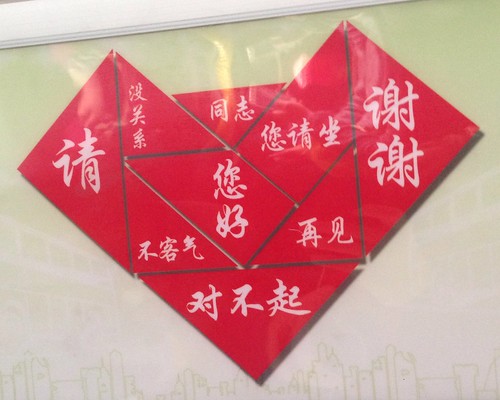9 Polite Phrases for the Subway
The following photo was snapped in a subway. It’s a public service announcement (or “propaganda poster,” if you prefer) that reminds passengers to be polite. I thought it was kind of interesting to take note of what expressions were chosen to illustrate politeness.
Here are the words, with pinyin and English translations, and a few observations of my own:
-
请: please
This clearly polite word is nevertheless just a little awkward for foreigners trying to speak polite Chinese, because it’s not nearly as ubiquitous as “please” is in English.
-
没关系: it doesn’t matter
The nice response to “I’m sorry.”
-
同志: comrade
This word is a bit old-fashioned. It’s also modern slang for a gay person.
-
您请坐: please sit
您 is the polite form of 你, plus you have the 请 in there. You might say this if you were being super polite to an elderly passenger while giving up your seat. (您 is also more common in northern China.)
-
谢谢: thank you
Can’t go wrong with “thank you!”
-
您好: hello
您 is the polite form of 你, so this is the politer form of 你好. (It also poses a translation problem… Maybe you come close if you use “hi” for 你好 and “hello” for 您好? The difference is still bigger in Chinese, though.) The expression 您好 also reminds me of customer service reps.
-
不客气: you’re welcome
Literally, “don’t be polite.”
-
再见: goodbye
I never really thought of this as polite, exactly, but I guess it’s better than taking leave without a word?
-
对不起: I’m sorry
Of course.


您 and 你 is very similar to “Vous” and “Tu” in French respectively.
I’ve been using this translation all over when I was in China, and after a few years there it appeared to feel appropriate. You don’t have that in English though, so that’s difficult to explain. But it’s definitely NOT like “Hi” and “Hello” : both mean “Hi OR hello”, but 您 implies you’re adressing with more respect, for instance to an older person, or someone of higher rank or simply someone you’ve never met.
That’s why some English speaking people sometimes appear to sound “harsh” when adressing to people they don’t know with “Tu” directly, where we native French-speaking people would normally use “Vous”. But the accent always tells us they’re not native French speakers, so we never really bother, it’s rather amusing and funny than impolite 😉